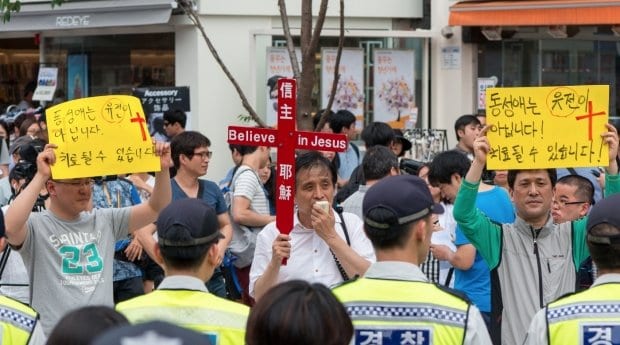South Korean LGBT rights activists insist that despite a police ban, this year’s 16th annual Seoul Pride parade will go ahead on Sunday, June 28, as scheduled.
“The Pride parade must go on,” says Candy Yun, 35, of the Korean Queer Culture Festival (KQCF). “We will make it. I am sure we will make it.”
According to Yun, police rejected the KQCF’s parade application May 30 due to concern there would be conflict with conservative Christians organizing a counter-demonstration, as well as concern that both groups would block traffic.
Media reports seem to corroborate Yun’s statement. A police officer at Namdaemun Police Station reportedly told the Korea Observer, an online English-language investigative news source, that the police are concerned about a standoff between opposing groups.
“Rallies may be banned wherever two or more rallies are planned by groups with conflicting goals and on Article 12 where rallies may be banned whenever there is a possibility of inconvenience to pedestrian and vehicle traffic,” the police prohibition notice states, according to the Korea Observer.
On June 2, the KQCF held a press conference in Central Seoul, announcing it would bring a lawsuit against the police, and demanding the ban be overturned.
Difficulties began in May, when the KQCF applied to hold its annual queer cultural festival in Daehangno, a bohemian neighbourhood in Seoul, on June 13. When the group tried to apply for a permit, it found none available.
“We found that the conservative Christian group already took out permits all over the place for that weekend,” Yun tells Daily Xtra. “So we couldn’t apply at all.”
A previously unknown Christian umbrella group, “Love Your Country, Love Your Children,” found out about the KQCF’s application, though Yun doesn’t know how. “They might have some spies, or they might have some friends,” Yun says. “Who knows?”
Attempts to locate anyone from the apparently ad hoc “Love Your Country, Love Your Children” for comment were unsuccessful.
The KQCF moved its date and venue to June 30 at Seoul City Plaza in Central Seoul and managed to book the Plaza without any trouble, so the festival is still scheduled to go ahead there. But the parade, separate from the festival itself, is a different problem, as it requires police permits.
The local police station asked the group to apply for a parade permit at midnight, May 28. Yun doesn’t know why they chose such an odd hour. “I don’t know, they prefer midnight maybe!” she says, laughing. When members of the KQCF arrived on May 20 to confirm, they discovered the Christian group was already camped out to get its own permit for the same day.
“We didn’t have any choice, so we started to make a line behind them,” Yun says. “We waited for eight days camping and sleeping outside.” Their application was rejected.
A source at the Christian Council of Korea (CCK) says the CCK, a conservative Christian umbrella group that claims to represent 12 million Korean Christians and 55,000 churches, is not affiliated with “Love Your Country, Love Your Children.” But he says the CCK supports their aims.
“We’ve been opposing [Pride] for many years,” the CCK team leader says, on strict condition of anonymity. He describes homosexuality as sinful, and he fears it could influence young people.
In 2012, the CCK tried to have Lady Gaga banned from South Korea for being “homosexual and pornographic.”
“Korean people are not very familiar with this issue,” the CCK leader says, “which means many groups of people are worried, because we have younger generations, and they are in the period of forming their values.”
When asked about the free speech implications of the police prohibiting Seoul’s Pride parade, he argues that gay men removed their shirts and pants at last year’s rally, an action he calls “inappropriate.” “I think people in general do not think their way of having a parade is appropriate for people in Korea.”
At last year’s parade, Christian protesters laid down for four hours in front of the parade to stop it.
“We’ve had the Pride parade for 16 years this year. And we’ve never disturbed people or made trouble at all,” Yun says.
“It seems obvious to me that there is underhanded collusion between fundamentalist Christians in Korea and the police,” alleges Reverend Daniel Payne, 35, who leads the LGBT-affirming Open Doors Metropolitan Community Church in Seoul, and is a gay man. “There is no other logical explanation — despite the police explanation of traffic congestion — for banning the parade this year.”

 Why you can trust Xtra
Why you can trust Xtra


